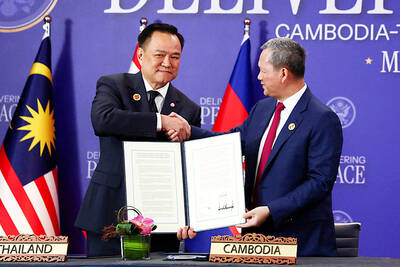French President Nicolas Sarkozy said he would cut France's nuclear arsenal to fewer than 300 warheads, seeking to balance defense of the nation -- he mentioned the threat from Iran -- against budgetary and changed strategic considerations.
In his first major speech as president on the French deterrent, Sarkozy also urged the US and China to fully commit to a treaty banning tests of nuclear weapons.
In addition, Sarkozy shifted somewhat from the nuclear doctrine of his predecessor, Jacques Chirac, by being slightly more ambiguous about the circumstances that might lead France to employ its nuclear weapons.
Sarkozy's decision to reveal the rough size of France's arsenal -- the Defense Ministry said the exact number of warheads is still secret -- appeared aimed at prodding other nuclear powers to be equally transparent.
AIRBORNE
Many of France's nuclear weapons are carried aboard submarines, with the rest on warplanes. Sarkozy said the airborne component would be cut by one-third, specifying that that included nuclear weapons, missiles and planes.
"After this reduction, our arsenal will include less than 300 nuclear warheads," he said on Friday. "That is half the maximum number of warheads that we had during the Cold War."
He also said that none of France's weapons is targeted at any nation.
SQUADRONS
France's airborne nukes are carried by three Air Force squadrons of Mirage 2000N and another Navy flotilla of upgraded Super Etendard jets.
They are all to be replaced by high-tech Rafale jets, in Air Force and Navy versions.
French defense expert Francois Heisbourg said the air fleet modernization allowed the size of the nuclear arsenal to be trimmed.
"When you have better planes taking over for older planes, you can afford to reduce the numbers," said Heisbourg, special adviser to the Paris-based Foundation for Strategic Research think-tank.
"That doesn't make us virtuous guys in itself, although of course it's nicer to say the numbers are going down than the numbers are going up. What does make us more virtuous than we were before is by saying `By the way, that means we're going to have 300.' And that meaning is, `Oh by the way, dear Chinese friends, you better tell us how many you've got.'"
The Federation of American Scientists, which tracks nuclear arsenals around the globe, said in a status report for this year that France had 348 strategic nuclear weapons. It lists 193 for sites and for negotiations on treaties to ban short and intermediate-range ground-to-ground missiles and to ban the manufacturing of fissile material for nuclear weapons. He also pressured to China and the US to ratify a nuclear test ban treaty they signed in 1996. France ratified it a decade ago.
RATIFICATION
Heisbourg said ratification by China and the US would "put pressure on countries that have been building things that look like test sites, like the North Koreans or, indeed, the Iranians."
He also said a global treaty banning intermediate-range missiles could put severe pressure on India, Iran, Pakistan and North Korea.

Shamans in Peru on Monday gathered for an annual New Year’s ritual where they made predictions for the year to come, including illness for US President Donald Trump and the downfall of Venezuelan President Nicolas Maduro. “The United States should prepare itself because Donald Trump will fall seriously ill,” Juan de Dios Garcia proclaimed as he gathered with other shamans on a beach in southern Lima, dressed in traditional Andean ponchos and headdresses, and sprinkling flowers on the sand. The shamans carried large posters of world leaders, over which they crossed swords and burned incense, some of which they stomped on. In this

‘NO COUNTRY BUMPKIN’: The judge rejected arguments that former prime minister Najib Razak was an unwitting victim, saying Najib took steps to protect his position Imprisoned former Malaysian prime minister Najib Razak was yesterday convicted, following a corruption trial tied to multibillion-dollar looting of the 1Malaysia Development Berhad (1MDB) state investment fund. The nation’s high court found Najib, 72, guilty on four counts of abuse of power and 21 charges of money laundering related to more than US$700 million channeled into his personal bank accounts from the 1MDB fund. Najib denied any wrongdoing, and maintained the funds were a political donation from Saudi Arabia and that he had been misled by rogue financiers led by businessman Low Taek Jho. Low, thought to be the scandal’s mastermind, remains

Near the entrance to the Panama Canal, a monument to China’s contributions to the interoceanic waterway was torn down on Saturday night by order of local authorities. The move comes as US President Donald Trump has made threats in the past few months to retake control of the canal, claiming Beijing has too much influence in its operations. In a surprising move that has been criticized by leaders in Panama and China, the mayor’s office of the locality of Arraijan ordered the demolition of the monument built in 2004 to symbolize friendship between the countries. The mayor’s office said in

FIGHTING CONTINUES: Thai military dropped 40 bombs on border areas, Cambodia said, while Bangkok said Phnom Penh launched heavy attacks and damaged homes Cambodia yesterday accused Thailand of intensifying its bombardment of disputed border areas, even as officials from the two countries attend a multi-day meeting aimed at negotiating an end to deadly clashes. The neighbors’ long-standing border conflict reignited this month, shattering an earlier truce and killing more than 40 people, according to official counts. About 1 million people have also been displaced. Cambodian and Thai officials were in their third day of talks at a border checkpoint, with ministers of defense from the two countries scheduled to meet today. However, the Cambodian Ministry of National Defense said Thailand’s military carried out a heavy